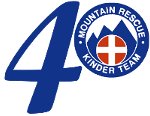
The Kinder 40 Project
1971 was notable as the year in which a man played golf on the moon and the Kinder Mountain Rescue Team (KMRT) came into being.
KMRT was created from the Sett Valley Mountain Rescue Team and the Goyt Search and Rescue Team. KMRT is believed to be the only mountain rescue team named after a mountain and not a valley and at times (usually during a missing person search somewhere around Kinder Low), particularly apt.
‘To understand the history of mountain rescue in the Peak District’ we should go back before the 1939 war. Walking and climbing in the Kinder area had been very restricted prior to the passing of the National Parks and Access to the Countryside Act in 1949 and the establishment of the Peak District National Park in 1950 and their making access agreements with landowners who had previously attempted to prevent all access by those without their written permission to their grouse moors. The only public paths were the Snake Path from hayfield and the path from Hayfield to Edale via Edale Cross and Jacob’s Ladder.’
Kinder Mountain Rescue Team: A Short History by Dr Peter Andrew
Anyone who has spent much time on Kinder has seen the remains of the aircraft that have crashed on the mountain – from the Liberator to the Sabres. Most of these crashes occurred in the second world war. In response to this terrible loss of life the RAF established rescue teams. These were all volunteers, all servicemen and usually stationed near to the mountains such as Harpur Hill in Buxton who were the nearest team to Kinder.
The mass trespass may have happened in 1932 but it was the access agreements coupled with the inexorable rise of the car that led to an increase in people enjoying their right to roam – hill walking and rock climbing in the Peak District. Hayfield, where KMRT is based, was easily accessible by bus, train and car.
Since the 1930s the Mountain Rescue Committee (MRC – now the Mountain Rescue Council) had been setting up Mountain Rescue Posts. It was 1950 before Kinder got its very own comprised of a stretcher, casualty bag (like a very heavy duty sleeping bag) and a basic first aid kit that resided at Tunstead House, Reservoir House and finally the Filter House.
‘This equipment was nearly always used by ad-hoc groups of people recruited by the post supervisor and local policeman from members of the victim’s party, people on the crag or moor and other climbers and walkers in nearby climbing club huts, hotels, pubs and hostels immediately after an accident… The problem in Hayfield was that, unlike the Lake District and North Wales, there were no climbing club huts, hotels or hostels catering for climbers and walkers – they all went home by train, bus or car each evening. The local policeman had to rely on his knowledge of local residents who knew the way over Kinder when an accident occurred or a person was reported missing on the hill.’
Kinder Mountain Rescue Team: A Short History by Dr Peter Andrew
There was an obvious need for a mountain rescue team of stable volunteers who could be called upon when needed. In response the New Mills Mountain Rescue Team was set up in 1959. Call outs nowadays are by text message but in 1959 a knock on the door was notice of an incident.
Once out on the hill communications were also limited. Car headlamps, rocket flares and even bell ringing was used to signal teams.
In 1964 three scouts died in the Four Inns Walk tragedy. This demonstrated the need for a large number of skilled and experienced rescuers. This was achieved by bringing together all the rescue teams under the single banner of the Peak District Mountain Rescue Organisation (PDMRO) which organises and controls operations. One key thing about mountain rescue is that whilst each team has its own primary operating area, the secondary operating area is the rest of the UK. In the Peak District, this means that if one team needs extra manpower for an operation, they will call out other teams as recent call outs show. Smaller teams such as the New Mills and Sett Valley teams were encouraged to merge, and the Kinder Mountain Rescue Team was born.
Since 1971 there have been a number of improvements from the use of helicopters to rapidly evacuate casualties to hospital to personal radios issued to every team member. The basic first aid kit is consigned to history as nowadays hill parties set off with a casualty care kit containing drugs and equipment recommended by the MRC as well as oxygen, entonox and even defibrillators. Stretchers are becoming lighter and more versatile and LED torches shine brighter and last longer.
Most of this gear would be unrecognisable to a KMRT member from 1971 but the dedication of the team members remains constant. Every member of Kinder Mountain Rescue Team commits to training and working with each other.
It doesn’t matter whether it is lashing down with rain, a howling gale, snow and ice or glorious sunshine – even if as one team member has remarked ‘You wouldn’t send a dog out in this’ – the men and women of Kinder Mountain Rescue Team have been saving lives in wild and remote places for forty years. We need your help to continue to do so for another 40 years.
Written by past team member AJ, who has sadly stepped down from her role.
Key dates and facts taken from Kinder Mountain Rescue Team: A Short History Dr Peter Andrew, MBE, to whom the team remains very much indebted.
